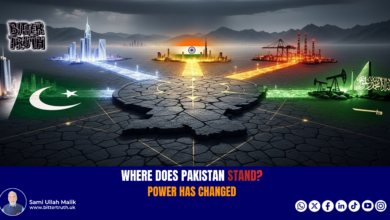Trump, Voice of America, and the Crisis of Press Freedom
Yuan as a Global Currency: Reality or Illusion?
Establishment and Role of Voice of America
Voice of America (VOICE OF AMERICA) was established in 1942 during World War II to counter Nazi propaganda. Its primary objective was to provide independent and impartial news worldwide. Over time, it became a crucial tool in promoting Western ideologies against communism and played a significant role during the Cold War.
VOICE OF AMERICA broadcasts in 50 languages, including Urdu, Pashto, Dari, and Chinese. In 2014, its Urdu service was launched in Pakistan, which local journalists regarded as an excellent source of independent news reporting. Today, Voice of America reaches millions of people worldwide. Similar to the BBC World Service, it is a government-funded media organisation aimed at representing the United States on an international platform.
Trump Administration’s Funding Cut
President Donald Trump signed a presidential order cutting funding for the US Agency for Global Media (USAGM), which oversees Voice of America, Radio Free Europe, and Radio Free Asia. As a result, more than 200 employees in Pakistan, Iran, and Afghanistan were suspended. In total, over 3,000 employees worldwide were placed on administrative leave.
The White House justified this decision by stating that taxpayers’ money should not be used to promote “radical left-wing propaganda” or an “anti-Trump narrative.” This moves affected millions of listeners across more than 50 countries where VOICE OF AMERICA broadcasts in 40 languages.
Following the funding cut, several VOICE OF AMERICA programs, including the Urdu service’s Haqq’aiq ki Talash (In Search of Truth), Azadi ki Awaz (Voice of Freedom), and a Chinese program against censorship in China, were discontinued. International media watchdogs such as Reporters Without Borders (RSF) and the Committee to Protect Journalists (CPJ) condemned the decision, calling it an attack on public access to information. The Trump administration defended its stance by arguing that VOICE OF AMERICA promoted biased reporting during elections through so-called “fake news.”
Allegations of Bias and Political Interference
President Trump accused VOICE OF AMERICA of being “anti-Trump” and “radical,” leading to the decision to terminate its funding. The White House labelled VOICE OF AMERICA as a partisan organisation that, according to right-wing politicians, promoted left-wing ideologies. It was argued that a taxpayer-funded institution should remain entirely neutral and support national interests rather than contradict government policies.
Throughout his tenure, Trump repeatedly criticised VOICE OF AMERICA, claiming that it misrepresented his administration’s stance and promoted an “anti-American” narrative. He argued that VOICE OF AMERICA sometimes supported foreign governments’ perspectives at the expense of US interests. Reports suggested that the Trump administration attempted to influence VOICE OF AMERICA’s content to align with its policies.
Reactions and Global Impact
VOICE OF AMERICA Director Michael Abramowitz stated that he was among the 1,300 employees placed on leave, expressing his dismay over the organisation’s first shutdown in 83 years. He remarked, “This order has rendered VOICE OF AMERICA incapable of fulfilling its crucial mission at a time when adversaries like Iran, China, and Russia are spending billions to spread false narratives against the US.”
Trump’s decision came amid growing criticism from conservative circles against these news services, while some experts emphasised their role in promoting independent journalism worldwide. The National Press Club, a leading US journalists’ organisation, declared that the order undermined America’s long-standing commitment to a free and independent press.
The statement read, “An entire institution is being dismantled. This is not just about dismissing employees—it is a fundamental shift that threatens the future of independent journalism at VOICE OF AMERICA.” Meanwhile, Czech Foreign Minister Jan Lipavský expressed hope that the European Union could help sustain Radio Free Europe/Radio Liberty’s operations in Prague. He pledged to raise the issue at an upcoming meeting with EU foreign ministers to explore options for partial financial support.
Following the presidential order, contrasting views emerged, with VOICE OF AMERICA Director Robert Liley and media experts condemning the move as an attack on press freedom. Media analysts debated whether this decision was a suppression of free speech or a step toward ensuring neutrality. Trump’s supporters argued that VOICE OF AMERICA was working against US interests and that there was a need to align with the “America First” policy championed by Trump.
This decision remains a subject of intense debate, with advocates of press freedom seeing it as a major setback, while Trump’s allies defend it as necessary for maintaining national interests.
International Reactions to VOICE OF AMERICA Funding Cuts and Global Implications
The decision to cut funding for Voice of America(VOICE OF AMERICA) has sparked international reactions, raising concerns about journalistic neutrality and press freedom in the United States. Critics argue that if government institutions restrict independent media, it could set a dangerous precedent for other media organisations in the future. VOICE OF AMERICA has played a crucial role in highlighting US policies on the global stage and promoting democratic values. The shutdown of this institution could negatively impact America’s international reputation, particularly in countries where press freedom is already under threat.
This decision is expected to have significant repercussions in Pakistan and other countries. Millions of listeners across Pakistan, India, the Middle East, and Africa rely on VOICE OF AMERICA broadcasts. Weakening this institution could limit access to independent news sources and increase pressure on alternative media platforms. The move could also deepen political polarisation in the US, with right-wing politicians and conservative media framing it as a necessary government reform, while liberal circles and press freedom advocates condemn it as a severe blow to free journalism.
In response to VOICE OF AMERICA’s closure, the British government has announced an additional £200 million in funding for the BBC World Service. The BBC has also expanded its Urdu and Pashto broadcasts, aiming to attract VOICE OF AMERICA’s displaced audience.
Elon Musk’s Support for Defunding VOICE OF AMERICA
Elon Musk, Trump’s advisor and the world’s richest man, has openly supported the decision to shut down VOICE OF AMERICA. On his social media platform X (formerly Twitter), Musk has repeatedly advocated for reducing government expenditure and limiting the size of state-run institutions. According to Musk, the media should remain independent but should not be reliant on government funding. He argues that state-funded media organisations often become ineffective and operate with hidden political agendas.
The defunding of VOICE OF AMERICA has sparked fresh debates about its future and global impact. Media experts predict that the proposed executive order could significantly weaken America’s cultural influence worldwide, allowing institutions like the BBC and other international broadcasters to step in and fill the vacuum.
Musk, one of Trump’s key campaign donors, has long supported policies aimed at downsizing state institutions. He had already boycotted VOICE OF AMERICA on his platform X before the decision was officially announced. It is believed that Trump was highly influenced by Musk’s ideas, leading to this executive order. Trump’s corporate tax cuts have greatly benefited Musk’s companies, such as Tesla and SpaceX, with expectations of further regulatory relief in the aerospace and autonomous vehicle industries.
The Business and Political Ties Between Trump and Musk
Musk made the highest financial contribution to Trump’s election campaign, which is widely seen as a strategic investment. Observers believe that if Trump secures re-election, Musk’s companies could receive preferential treatment in NASA contracts and data projects. The close ties between the two men reportedly began in 2021, when Musk reinstated Trump’s Twitter account. Following this, Musk donated $15 million to Trump’s campaign, strengthening their alliance.
Trump’s potential victory could grant Musk greater influence over government policies. In return for his support, Musk has already been offered a role in Trump’s cabinet, along with control over a significant government institution. The billionaire is also set to benefit from a 35% corporate tax reduction, resulting in approximately $700 million in financial relief. Additionally, SpaceX is expected to receive nearly $3 billion in NASA contracts.
Musk’s growing power can also be seen in his digital influence. His leadership in Trump’s social media campaign is believed to have played a pivotal role in their alliance. There are even reports suggesting that SpaceX could be awarded the ambitious “Mars Mission” project, with a plan to establish a human colony on the planet by 2030. Musk’s companies are also expected to receive more government subsidies and contracts. Some sources indicate that Trump is being directly briefed on Musk’s activities and strategies.
Musk’s Corporate Policies and Labour Controversies
Recently, Musk faced severe criticism from labour unions after issuing a strict directive to Tesla employees. In an internal email, he reportedly stated, “How much work did you do last week? Spend at least 40 hours in the office or consider it a resignation.” Unions have condemned this as a violation of workers’ rights, sparking tensions between Musk and government officials. At the same time, reports suggest that Trump is being regularly updated on Musk’s moves, which has raised speculation that Musk’s influence might be curtailed in the near future.
US Trade Policies and Comparisons with Japan and China
Looking back 40 years, Japanese products—particularly automobiles (Toyota, Honda) and electronics (Sony)—dominated the US market, leading to an annual trade deficit of $50 billion for America. This prompted the US to adopt aggressive trade policies, imposing a 25% tariff on Japanese imports. In response, Japan raised tariffs by 2.5%, but ultimately, the US gained an additional $18 billion in tax revenue from the tariffs.
Trump is now taking a similar stance against China, branding it the “new Japan” in global trade. Recently, he announced a 10% increase in tariffs on Chinese goods, prompting China to retaliate with an equal tariff hike on American products. Trump’s goal appears to be achieving the same trade advantages against China that the US once sought against Japan. However, China has signalled that it will match any American tariff increase with reciprocal measures, escalating tensions between the two economic giants.
It has now become evident that China and Russia have significantly bolstered their gold reserves by making substantial purchases from the global market. In 2023, Russian President Vladimir Putin, leveraging these increased reserves, announced the foundation of a joint currency. Experts predict that by 2025, a framework for a BRICS currency could be unveiled, potentially shaking the dominance of the US dollar. The reality of an alternative to the dollar became clearer when reports surfaced that China is actively working towards making the yuan a global currency. China has already initiated trade agreements in yuan with 19 countries.
By 2023, the yuan accounted for 3% of global trade. However, despite this progress, experts argue that China and Russia’s efforts to position the yuan as an alternative global currency may not achieve complete economic independence just yet. This is why the United States has viewed every attempt to modify the SWIFT system as an economic act of war. Meanwhile, Donald Trump has warned BRICS nations (Brazil, Russia, India, China, and South Africa) that any attempt to replace the dollar will be considered an act of hostility against the United States.
In the region, China is leveraging India’s ongoing border and political disputes with both China and Pakistan. At the same time, it is actively supporting alliances like QUAD to counter China’s trade influence. However, American trade experts now acknowledge that relying on India, which they liken to a “lame horse,” has yielded little benefit to the US, whereas India itself has reaped considerable advantages.
According to recent global market statistics, the US dollar currently makes up 59% of international reserves, while the yuan accounts for just 2.8%. To reinforce the dollar’s dominance worldwide, the US has allocated an additional $1.3 billion to enhance its SWIFT system. However, there are still significant obstacles to launching a unified BRICS currency.
Trump’s decision to halt funding for Voice of America(VOICE OF AMERICA) is a highly significant and controversial move, one with profound political and diplomatic implications. The closure of VOICE OF AMERICAhas sparked an intense global debate about media freedom and the future of US soft power. Media analysts argue that Trump’s actions not only undermine journalistic independence but also cast doubts on the impartiality of American media. More broadly, this decision could substantially weaken US influence on the global stage. It also reflects how deeply intertwined politics and media have become in the United States. Looking ahead, this move may have lasting consequences, particularly regarding how state-funded media can remain independent of government policies.
If the proposed executive order on VOICE OF AMERICAis enforced, America’s cultural influence worldwide could significantly diminish. In response, organisations like the BBC and other international broadcasters will likely step in to fill the void. Trump’s actions have not only raised concerns about press freedom but have also further empowered figures like Elon Musk, who wields immense influence over the media and political landscape.
Japan’s historical experiences, coupled with BRICS’ ongoing efforts, suggest that a new era of economic and cultural rivalry is underway. In the coming years, these conflicts could prove decisive for America’s global leadership. It is also possible that the current US policies may hasten its decline. History has repeatedly shown that no empire remains at its peak forever.






